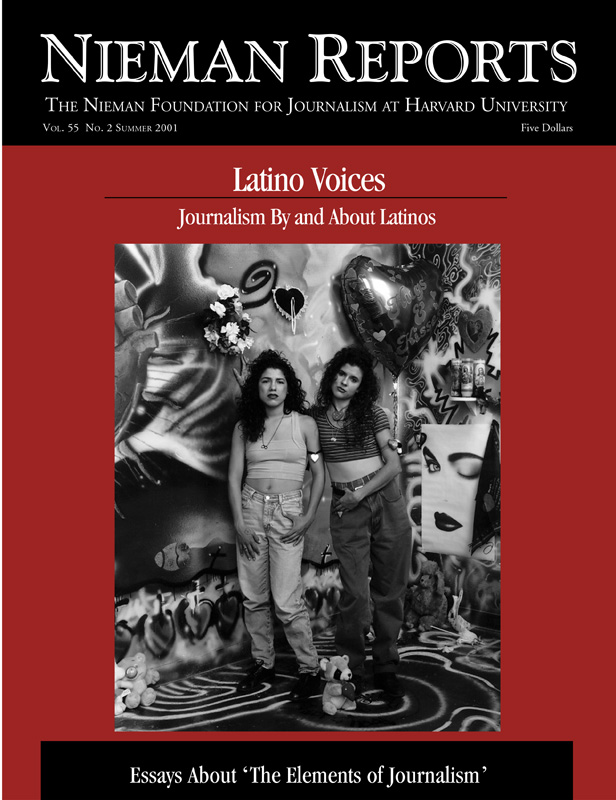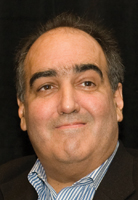I awoke to the rich possibilities of a life in journalism on a June day 23 years ago, the last day of my first week as a summer intern at the Chicago Tribune. For all its hallowed history, my hometown paper was much like most other papers across the country then: Its staff was almost entirely white, largely male, and oblivious that either fact might make a difference. The day I walked in the door as an intern, I was the second Latino ever to work as a reporter there. Naturally enough, they gave me a desk next to the first, a young veteran named Roberto Suro.
I had read with admiration Roberto’s work in the Chicago Sun-Times about Latino street gangs in Chicago’s Humboldt Park neighborhood, his stories about the trials of Mexican immigrants in the Pilsen area, and his account of his journey to Fidel Castro’s Cuba. Roberto single-handedly had forged a new genre in Chicago’s rough-and-tumble journalism with his coverage of the city’s previously invisible Hispanic communities. Unable to compete with him, Tribune editors decided to hire him away from the competition to cover this strange new world that was growing so quickly just past the downtown skyline, beyond their line of vision.
Soon Roberto’s work gained attention beyond Chicago and, not surprisingly, job offers began to come in. On this Friday, he had just informed our editors that he’d decided to accept an offer from Time magazine that looked like it could lead to an assignment covering the Middle East. This was an opportunity he couldn’t pass up, I recall him saying, a chance to lift his sights beyond Chicago and see the world as a foreign correspondent, covering a serious story and putting his career on an entirely different track.
But now Roberto was back from one editor’s office, his eyes glazed and a dazed half-smile of shock on his face. He had offered to put off starting this new job for three or four months in order to give the paper time to hire a replacement. The response: No need to wait, was the gist of it. The Tribune didn’t want anyone who didn’t want to be at the Tribune. So there was Roberto, asked to leave the building immediately, cleaning out his desk.
The only person more stunned than Roberto that day was me. In an instant, at age 21, I went from being the second Latino to ever work at the Tribune to being the only Latino at the paper, a situation that would remain unchanged for more than a year. I didn’t know it then, but this boost to Roberto’s career—however pained he was that morning—would help jump-start my own. And the lessons I learned from that experience have guided me to this day, as a correspondent for 14 years and as an editor for the last nine.
To be sure, the Tribune is a vastly different place than it was then. Today we would never let someone we valued as much as Roberto leave without trying our damndest to keep him. We want to attract more Roberto Suros to our paper and our business, not lose them, and it is up to us, as news managers, to provide them with rewarding challenges that will help them want to make their home among us. Like the Tribune, the news business has moved on since those days, too, and so has the country, even if none of us have moved far enough.
But therein lies a breathtaking opportunity. Today young Latino journalists have an unprecedented opportunity to create a unique niche for themselves and fill a real need. The need is visible across the country; the rise of Latino influence on American politics, popular culture and society is exploding onto the nation’s consciousness before most news organizations are ready to handle it. Today no serious newspaper can pretend to serve its community without sophisticated reporting about Hispanic affairs.
The 2000 Census figures trumpet growth in the Latino population, spreading in significant numbers for the first time to rural hamlets from North Carolina to Nebraska, where Spanish rarely has been heard. For Latino journalists, especially, but also for other Spanish-speaking reporters, this dramatic demographic shift is a chance to cover the fundamental story of our times, the rapidly shifting dynamics of race and ethnicity and identity in America. The changing nature of race relations will affect every aspect of national life as we move beyond issues of black and white to an emerging kaleidoscope of colors that are defining the new American experience. As Latinos, many of us with a foot firmly planted in two cultures, we can apply our language skills and experiences as the children of immigrants to provide readers with understanding and deeper meaning of these changes sweeping the nation.
But as I realized, watching Roberto clean out his desk, we Latinos also owe it to ourselves and to our mission as journalists to look beyond that niche and expand our professional possibilities. After leaving the Tribune, Roberto went on to a distinguished career as a foreign and national correspondent for Time, The New York Times, and The Washington Post. He has been posted in Beirut, Rome, Houston, New York, and Washington, D.C., where he has been equally at home at the Justice Department covering immigration issues and the Monica Lewinsky scandal as he has been at covering the Pentagon writing about national security.
Journalism could use more Roberto Suros. Yet few news organizations have done well at promoting Latinos to positions of real leadership. Nor have we assigned nearly enough Latino reporters to cover prestigious news beats. These remain largely the province of white men: the White House and politics and national security, to say nothing of the increasingly important areas of business and science and technology. These are high-profile jobs, and high-stakes hires, where experience and a proven track record count heavily.
As an editor, I have felt profound frustration and disappointment that the pool of minority journalists experienced in covering America’s political and financial establishment is not larger. There are many reasons for this, none of them good enough. For all the public emphasis on diversity in most of our big media companies, the people who run them are by and large white, and most of them are the children of privilege, just like most of their counterparts elsewhere atop corporate America. Some of this is because media executives, like most people, tend to feel most comfortable with people whose outlooks and experience and temperament parallel their own. Still, this is something to be guarded against, and the best newsroom managers value real diversity—diversity of thought and experience and outlook—especially in an enterprise as creative as producing strong journalism.
But for real progress to occur, for the diversity that we see in our communities and in our potential audiences to take root in our newsrooms and strengthen our industry, we need more Latino journalists in leadership positions. The same goes for African Americans, Asian Americans, women and other people whose life experiences differ from the people who run our companies. Yet the central fact remains that people atop our news organizations are most likely to entrust newsroom leadership positions of broad responsibility and authority to journalists with the broadest possible professional experience.
Thus the vicious cycle: How do Latinos and other minority journalists get the broader experience we need to become leaders and managers? How do we expand our professional horizons when key jobs appear reserved for those who already have the most experience? And how do we reconcile two conflicting desires? The first is our desire to grow and reach out to the larger world and greater career opportunities. The second is the mission many of us have undertaken: to report in depth on Latino issues of vital importance to the larger society in which we form such an important part.
This is a difficult balancing act for many Latinos in journalism. There is no one right answer. Many prominent Latino journalists have made their mark with a strong focus on Hispanic issues—Frank del Olmo of the Los Angeles Times, Juan González of the (New York) Daily News, and former Latina magazine editor Sandra Gúzman are three distinguished examples who immediately come to mind. They do important work and serve vital roles in our industry. But Frank and Juan and Sandra are also well-rounded professionals, with the depth of experience to make an impact in other areas.
Many others have toiled in those same fields and then forged other paths to success. Among them are PBS correspondent Ray Suárez; veteran Newsweek correspondent Joe Contreras, whose postings have included the Middle East and Africa; NBC News producer Cecilia Alvear; ABC News correspondent John Quiñones; Miami Herald foreign editor Juan Vazquez and correspondent Juan Tamayo; The Dallas Morning News Editor Gilbert Bailón and his colleague, former Time foreign correspondent and diplomatic correspondent Ricardo Chavira, now the paper’s associate managing editor for foreign and national news.
We need—and our industry desperately needs—to provide greater opportunities that will help develop more of these Latino journalists who can do anything, including lead our newsrooms. In my own case, I’ve been lucky enough to have received a succession of opportunities at the Tribune, where I’ve had 11 jobs in 23 years. For three years after Roberto Suro left the paper I worked on our metro staff, learning the nuts and bolts of our craft by covering stories as a rookie reporter. I also tried to create a need for myself at the paper by focusing on a subject no one else was writing about, the spectrum of issues that could loosely be grouped under the heading of Latino affairs.
To my surprise and delight, the Tribune was happy to run stories you usually didn’t see in the paper, stories about why kids from broken homes found a sense of family in street gangs, accounts of the growing influence of Latinos in city school politics, tales of love overcoming the cultural clash in a Puerto Rican-Mexican marriage. This was fun and fulfilling and rewarding work, and I will always think that our newspaper and our readers were better off for it.
But I always kept Roberto Suro in mind, too, as someone whose footsteps I wanted to follow. To my eternal good fortune, the Tribune allowed me to roam the world, literally, for nearly 15 years, sending me twice to Latin America and on separate stints as the paper’s White House and diplomatic correspondent, covering the end of the cold war, German reunification, and the Persian Gulf War and its aftermath. The paper supported me in seeking a Nieman Fellowship, and then I was sent to roam California and the West as our Los Angeles bureau chief. All in all, it has been a dream of a ride, and I am unspeakably grateful.
But I had to want it, too, and consciously decide to reach beyond what was familiar and comfortable. For me that was the right choice. For young Latino journalists today, whatever your choice, learn from the experience of others, then make your mark by breaking your own new ground. Whichever way you go, whatever you decide to pursue, remember that fresh approaches to stories and new insights in reporting and writing are at the heart of excellent journalism, the kind that best serves our readers—and that provides the greatest possible career opportunities.
George de Lama, a 1992 Nieman Fellow and the son of Cuban immigrants, is associate managing editor for foreign and national news at the Chicago Tribune.



